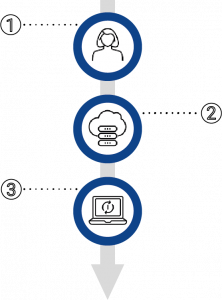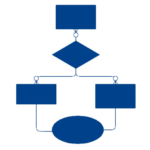
HOW IT WORKS
HOW IT WORKS
Taking care of the routine so you can innovate
Taking care of the routine so you can innovate
Automation as a Service
Convenient automation of your processes – simple, fast, reliable.
The most important thing for us is to provide you with long-term support. Cloudomation Engine enables far-reaching automation of software and processes tailored to your needs – thanks to our pro-code approach.
You don’t have developers in-house? No problem, if needed we can take over the development of automations for you. Or we can support you in developing your own customized Pro-Code automations. The basis of our work is the joint development of a first use case. Based on this, we automate all redundant, time-consuming and crippling tasks step by step and adapt your automations to growing complexity and requirements in the future.
Your effort in the process? Hardly any.
So that you’re free to focus on the important things again.
How does Cloudomation Engine work?

Hosting Cloudomation Engine
We host Cloudomation Engine for you in our secure cloud or as an on-premise managed service in your data center – so you really don’t have to worry about a thing. Alternatively, your IT-experts can host Cloudomation Engine themselves in a cloud of your choice or in your own data center.



Trigger
Process logic
Result
Schedules
Through these, automations are executed at a precise time or in specific intervals. Schedules are fully customisable and can include complex dependencies.
Webhooks
With webhooks, automations are initiated externally and can accept parameters and data as well as forward those to the automation.
Polling
Here, Cloudomation Engine monitors your third-party systems and reacts to any changes. For example, you can set new entries of a database as starting points of automations.
This way you won’t miss anything anymore!
Manually
Take off at the push of a button!
Detailed logging ensures the
traceability and auditability of your automations.
For each step you can read what was done when and which data was read or written when.
FAQ
Cloudomation Engine is a general-purpose automation platform that can be used to automate any software-based processes.
Cloudomation Engine is particularly suitable for automating IT processes that are executed repeatedly (regularly or irregularly, in any case several times in the same form) and have a certain complexity, since they e.g.:
- have many dependencies and conditions
- have special process logic that is, for example: unique to your company
- involve a large number of different software applications,
- involve systems that do not have standard interfaces or are difficult to integrate for other reasons,
- need to meet other special requirements that are difficult or impossible to map with common standard tools.
Cloudomation Engine is particularly popular among our existing customers in the following areas:
- DevOps (e.g. for release automation, test orchestration or orchestration of the entire CI/CD chain),
- Business Application Management (e.g. to provide services based on existing applications) and
- ETL and data integration (e.g., to keep data consistent and up-to-date across different systems, or to centrally prepare data for reporting, etc.). Cloudomation Engine is also used to automate classic business processes such as technical employee on- and offboarding, payroll, order management and the like.
Examples of selected customer projects can be found here: https://cloudomation.com/en/success-stories/
More examples of possible use cases here: https://cloudomation.com/en/use-cases
Cloudomation Engine is available both in the cloud and on-premise, as well as in hybrid deployments where cloud and on-premise workspaces are connected.
In the cloud, you can use Cloudomation Engine as a SaaS solution: we take care of the software and infrastructure, you use the platform without any maintenance effort. On-premise, you can either operate Cloudomation Engine yourself (self-hosted) or commission us to maintain and update your on-premise instance (managed on-premise).
You can find our prices here: https://cloudomation.com/en/pricing/
Our pricing model is based on licenses and the billing of productive connections. A connection is a connection to a third party system, e.g. a database query. These are counted and billed monthly – but only productive connections. In development mode, you can set up an unlimited number of connections for development and test purposes without incurring any costs.
The effort required to implement a use case depends on the complexity of the process to be automated. Simple task automations or point-to-point integrations can be implemented in half an hour, whereas “typical” automations usually require 3-8 days of effort. For a rough estimate, here are empirical values:
- MVP: 0.5-2 days
- Full automation with variations medium complex: 3-8 days
- Complex processes: 5-15 days
The rough experience values refer to the implementation of a single use case. If you have a specific use case in mind, we will be happy to prepare a non-binding rough estimate for you. Please arrange a non-binding initial meeting: https://cloudomation.com/en/make-an-appointment/
We are happy to support you actively in the implementation of your first use cases, either by developing completely on your behalf and handing over the “finished” process to you for operation, or by supporting you in word and deed in implementing your automations yourself.
Cloudomation Engine is a pro-code automation platform on which automatic processes are defined with Python. The classic area of use is in development and IT departments, where Cloudomation Engine is used by DevOps specialists, developers, integration specialists, system administrators and business application managers.
Cloudomation Engine is also used to automate business processes, but here it is primarily active in the background. Business users either do not work directly with Cloudomation Engine or are integrated into automated processes via small web forms or emails.
The biggest advantage of the pro-code approach is the significantly higher flexibility of code-based automation compared to RPA, no-code or low-code automation tools. These are well suited for automating simple processes, and allow non-technical people to quickly and easily define automations. However, the limits of what can be automated with these tools are quickly reached, and the maintainability and long-term use of such automations is also often difficult. Pro-code automation has the following advantages:
- Higher maintainability
- Long-term use of automations that can be easily adapted and extended
- Robust automations with flexible error handling capabilities
- Significantly larger scope of functionality and possibilities, both for automation and integration of applications
- Ability to automate more complex processes.
In this regard, automating a process with Cloudomation Engine is similarly fast as with RPA, no-code or low-code applications, which usually require significant training periods before automations are implemented. You can implement your first pro-code automation in just a few hours.
A detailed description of different automation approaches with advantages and disadvantages can be found in our whitepaper “A map through the automation jungle”.
Cloudomation Engine takes care of many of the things developers have to worry about when scripting automations themselves and it provides functionality that makes automation development much faster. Compared to a self-developed Python script, the development of an equivalent automation on the Cloudomation Engine platform is much faster and the quality is much higher.
For example, the Cloudomation Engine platform takes care of logging, scaling, resource allocation, it supports secure connection to third-party systems with simple connector features, with file handling, secrets management, git integration for version control, and many Cloudomation Engine-specific features like savepoints, which save the state of the automation at regular intervals, making error-handling easier.
Wrappers allow to add a meta layer to automations, endpoint mocking and caching lead to faster development times and less dependencies on third party systems, and the connector analysis enables real-time analysis of interfaces. The schema validation enables easy assurance of data quality; with settings you can control the handling of data and variables; locks and custom schedules make consideration of dependencies and schedules work; notifications are simple additions of email alerts; Cloudomation Engine offers forms to involve humans in automated processes and webhooks enable creation of custom REST endpoints with one click.
Thus, when developing Cloudomation Engine Flow scripts, the focus is on defining the logic needed to automate the process – Cloudomation Engine takes care of everything else.
Yes, Cloudomation Engine Flow scripts use normal Python syntax, extended with Cloudomation Engine-specific functionality that is similar to other Python modules and also uses standard Python syntax.
Note: However, only a certain set of third-party Python modules is available on the Cloudomation Engine platform. We are happy to add more Python modules for your use, but you cannot independently install Python modules on the Cloudomation Engine platform for security reasons.
From kick-off call to automation - in 3 weeks

1a) Non-binding initial meeting (Option A)
- 1 hour kick-off call to identify your first use case
- One automation expert from Cludomation, one decision-maker from your
side and one IT-expert from your side (optional)

1b) Use case workshop (Option B)
- 2 hour workshop to identify the automation potential in your company and create a list of priorised use cases
- One automation expert from Cloudomation, one decision-maker from your side as well as 1-3 IT-experts/subject matter experts from the departments that wants to automate (optional)

2) Collecting requirements
- 45 minute call to collect all technical details necessary for a first estimation as well as an implementation plan
- One automation expert from Cloudomation and one IT-expert/subject matter expert from your side

3) Offer
- Overview of effort and costs
- Latest one week after collecting all requirements

4) Implementation
- We implement the discussed use case for you
- 2-10 days of development effort in a time period of 2-7 weeks
- Done by you (supported by the Cloudomation team) or fully covered by Cloudomation

